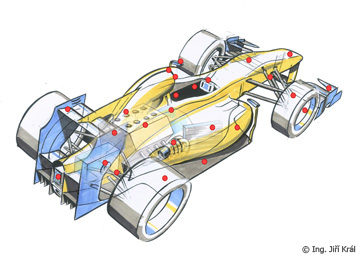A Tale of Two Cities at Baku City Circuit Azerbaijan Grand Prix Blends Old and New, Fast and Slow
Mike Arning/HAAS F1 | 17.6.17 | Aktuality
Haas F1 2017
A Tale of Two Cities at Baku City Circuit
Azerbaijan Grand Prix Blends Old and New, Fast and Slow
KANNAPOLIS, North Carolina (June 17, 2017) ŌĆō Romain Grosjean calls it ŌĆ£two different circuits in oneŌĆØ and Kevin Magnussen says ŌĆ£itŌĆÖs a mixture of Monza and MonacoŌĆØ. It is Baku City Circuit, a 6.003-kilometer (3.730-mile), 20-turn street course that hosts the Azerbaijan Grand Prix June 25.
The two Haas F1 Team drivers and 18 of their counterparts blast down two enormously long straights in a dumbbell-shaped layout that runs counterclockwise. The Herman Tilke-designed track blends old and new amid fast straights and slow corners. It winds through a modern, Eastern side where swank hotels and high-end shops reside, to a historic area where the streets are narrow and steep before returning to the mainstraight. A sharp left turn greets drivers at the end of that straight, not too dissimilarly from the Tilke-designed Circuit of the Americas in Austin, Texas, home to the United States Grand Prix. ItŌĆÖs a unique and challenging layout that is augmented by BakuŌĆÖs notorious winds, which are always prevalent. In fact, City of Winds is the unofficial, but literary, name for Baku.
Winds of change have been blowing all year in Formula One, with this new generation of higher-downforce racecar breaking track records at every circuit visited thus far in the 2017 FIA Formula One World Championship. Baku could buck that trend, however, as the track hosted its first grand prix last year when the lower-downforce cars of the previous era produced significant straight-line speed.
The higher-downforce cars of today arenŌĆÖt as quick in a straight line, but thanks to a wider front wing, larger barge boards, a lower and wider rear wing, a taller and wider diffuser and tires 25-percent wider than last year, these current-generation Formula One cars dart through corners at speeds never seen before this year.
With 20 turns built into Baku City Circuit, drivers will test the boundaries of the worldŌĆÖs fastest city circuit in an effort to make up the lost speed on the two main straights ŌĆō the 2.2-kilometer (1.367-mile) mainstraight along the promenade and a 1-kilometer (.621-mile) stretch that takes drivers away from Azadliq Square. GrosjeanŌĆÖs ŌĆ£two different circuits in oneŌĆØ and MagnussenŌĆÖs musing of Baku being ŌĆ£a mixture of Monza and MonacoŌĆØ are apt.
Because Baku City Circuit is so new, there is still plenty of learning to be had. Grosjean finished 13th in last yearŌĆÖs race after a potential points-paying result was derailed by debris getting caught in his carŌĆÖs radiator intake. Finishing right behind Grosjean was Magnussen, whose 14th-place drive came with his former Renault team.
Speaking of Renault, Haas F1 Team comes into the Azerbaijan Grand Prix locked in a tight battle with the factory-backed squad. Renault is seventh in the constructors standings, only three points ahead of Haas F1 Team. But with point-paying results in five of the seven races run this season, Grosjean and Magnussen are eyeing another points-paying effort in Baku to not only bolster their respective 12th- and 13th-place positions in the driver standings, but to also take hold of seventh in the constructors standings and potentially fight with sixth-place Williams, which currently enjoys a seven-point margin over Haas F1 Team.
In 2016, Haas F1 Team scored points in just five races. With that tally already having been equaled in 2017 with still 13 races remaining, the American outfit believes Baku can be the scene of another points-scoring effort that can surpass its 2016 mark and keep the midfield battle as tight as the corners around BakuŌĆÖs historic Sabayil Castle.




